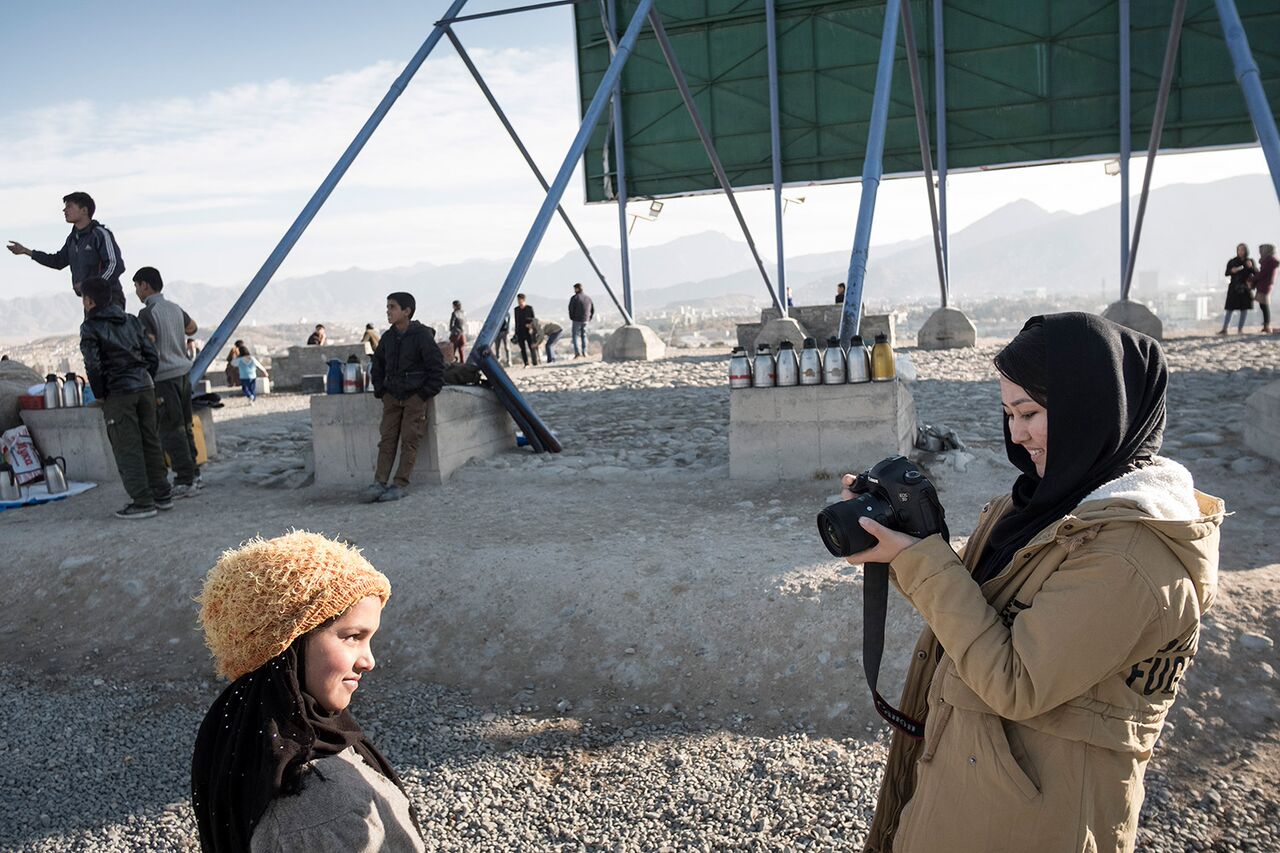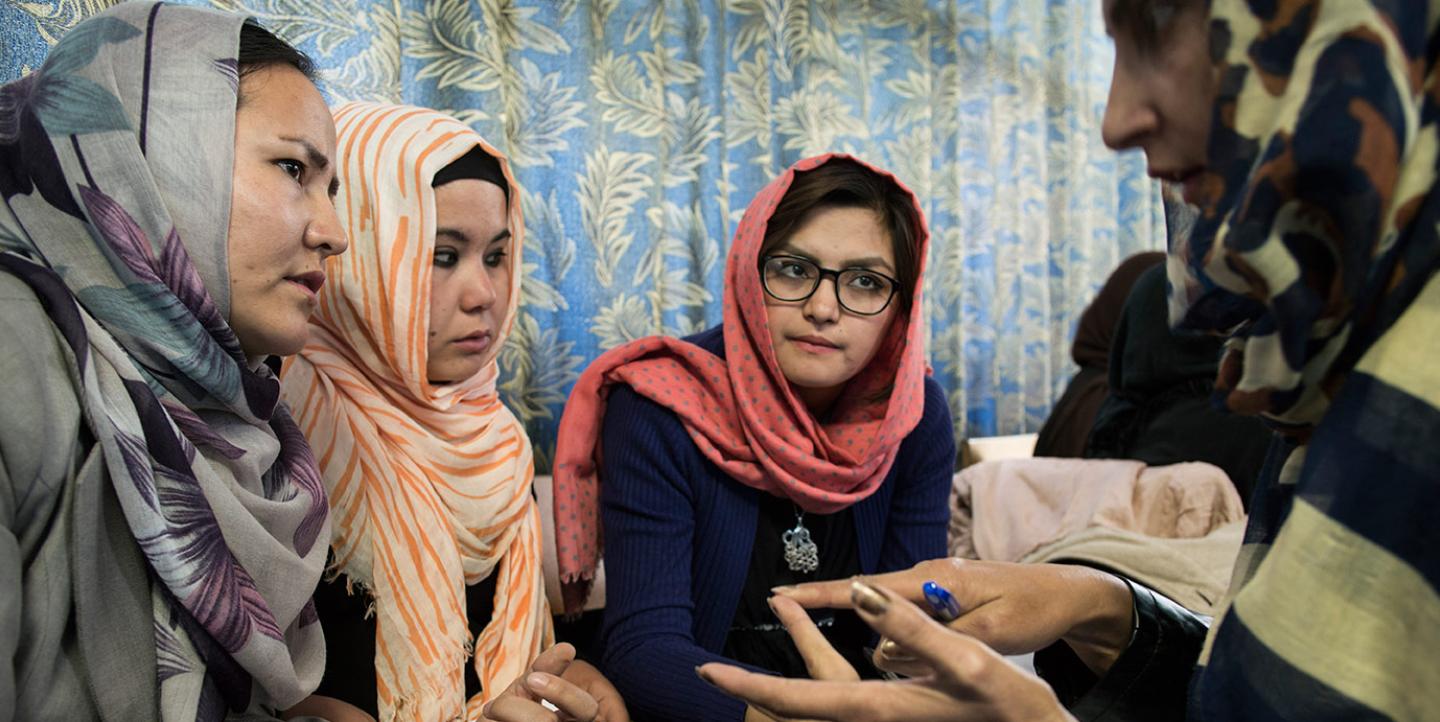Journalists are trained to be observers, reporting on events and conflicts but never getting involved. However, reporter Amie Ferris-Rotman and photojournalist Will Wintercross were so impacted by what they saw in the field that they decided to get involved in a new way: starting their own nonprofits.
Ferris-Rotman was a senior correspondent for Reuters in Afghanistan, while Wintercross was on assignment for The Daily Telegraph in Syria and Turkey during the Syrian civil war.
“I had an enormous sense of rage at my own company, at Reuters, for not employing local women despite the fact that we found ourselves in cases where we desperately needed them,” recalled Ferris-Rotman. “We found ourselves in situations where we couldn't film or couldn't speak to women in certain places because we didn't have Afghan female journalists with us.”
Ferris-Rotman felt that Reuters’ coverage was affected, as well as the perception of Afghanistan, a complex country. During her time there, from late 2011 to 2013, she tried to get her Singapore-based superiors to hire local women journalists but couldn’t convince them.
Reuters wasn’t alone.
“There wasn't a single Afghan woman working for any of the English-language international media when I was in Afghanistan, even though we were writing about women's rights constantly,” she said. “It made me really angry to the extent that I actually wanted to change something.”
Wintercross’ reckoning was equally emotional. After several assignments covering Syria from 2012 to 2014, which was falling into chaos, he felt powerless.
“[I] could write articles, shoot videos, shoot stills and I could see it wasn't making any difference,” he said.
One assignment, where he came close to being killed, had a profound effect on him. He met a Syrian grandmother near the Syrian border in Turkey who had fled her home country.
“It was really cold and she was cooking on a fire for her whole family,” he said. “She was so resilient and didn’t want to give up. I thought a lot about her.”
When he got back to the U.K., Wintercross decided he had to do something.
“I couldn't in good conscience say ‘I've done all I can,’ because I knew I could do more. There was no shortcut for directly helping people,” he said.
Starting a nonprofit
Ferris-Rotman was selected for a John S. Knight Fellowship at Stanford University, which allowed her to take a full year to develop her idea. After working on the project with other fellows and mentors, she launched Sahar Speaks, a mentoring and training program for female Afghan journalists.
Since its launch in 2015, Sahar Speaks has trained 23 Afghan female journalists in international reporting methods, hostile environment reporting, interview techniques, pitching for an international audience and more. Alumni stories have been published in outlets like The Huffington Post, and some alumni started working full time for outlets like The New York Times.
Wintercross launched the Syrian Refugee Relief Fund with his father, Brian Cross. They organize annual dinners to raise funds for things like prosthetic limbs for Syrian children and orphan support. In 2017, the dinner raised GBP35,000. They also partner with another U.K. charity, Syria Relief, which works on the ground in Syria.
Wintercross’ father, who has worked in charity before, was helpful in understanding “the language of establishing a charity.” Wintercross found the process complicated, especially since they were dealing with Syria, a war-torn country, which concerned bankers and legal authorities.
When he started the charity, Wintercross received support from his former colleagues at The Daily Telegraph. His editor bought a table for the fundraising dinner several years in a row, and the paper’s cartoonist agreed to give customized cartoons for the annual auctions.
Now that he works as a freelance photojournalist, Wintercross regularly connects with new people through his commercial work.
“When it comes to my charity, I’m completely merciless. I overhear someone and I ask them, ‘What were you saying about that place in France? Can I have it for a week?’” he said, explaining how he finds auction prizes.
Ferris-Rotman found the financial side of her organization to be a challenge.
“It's very strange to go from being a journalist to suddenly dealing with spreadsheets and basically begging people to give you money,” she said “If your project doesn’t have a business model — which mine did not, because we were not in the business of making money — it can be difficult to get funders to get on board.”
After the fellowship, she worked with the fellowship’s alumni office, which connected her to contacts and helped her draft grant proposals. Much later, she also received some help from the fellowship alumni fund.
Ferris-Rotman ran the organization on her own for three years, but since it didn’t pay enough, she also freelanced on the side.
In April 2018, she stepped back from Sahar Speaks to go back to full-time reporting as the Russia correspondent with The Washington Post. The initiative will be handled by a new head of programs back in London.
“It's been a very emotional decision,” she said. “I was incredibly attached to the ladies and their hard work. We’ve made a lasting impact.”
Ferris-Rotman said she still promotes her alumni and new students personally, and that she is proud of what Sahar Speaks brought her. She said it improved her own reporting and solidified her belief in local journalism.
“What I learned from Sahar Speaks is [that] people — especially women — who are in the country where they live are much better at telling the stories than we can,” she said. “That's part of the privilege that we have to understand, even though it means that we may have to step back. It means the stories will become richer, the world will become more interesting and better.”

Advice to journalists considering nonprofit work
Ferris-Rotman said that journalists who also have ideas for initiatives or charities should not give up, despite how different the industry is from journalism.
“If you have a good idea, and you work hard at it, it will eventually work out,” she said. “You've got to have an enormous amount of patience, commitment and determination.”
A Stanford advisor suggested she report out her initiative before launching it to make sure it had not been done before.
“Pretend you're actually reporting a story on your project. Call up sources, ask to be introduced to people [and] go for lunches. Act like a reporter,” she said. “The hard part is sticking with it and persevering. The easy part is reporting it out.”
Wintercross thinks journalists are particularly well-suited for communicating their charities’ goals and stories. During his annual dinners, he shows photos and videos of the children who were impacted thanks to his initiative to appeal to donors.
He advises potential journalists-turned-founders to surround themselves with people with different skill sets.
“You need someone who's super organized, someone who's super connected to people who can bring the money [and] you need someone who can find quirky auction prizes,” he said. “Surround yourself with people who are positive, ‘can-do’ people.”
After several years of working on their projects, Wintercross and Ferris-Rotman are grateful they took the leap away from reporting to develop new ways of helping.
“Founding Sahar Speaks was one of the greatest gifts given to me,” said Ferris-Rotman. “These Afghan women are incredibly inspirational and the strongest people I've ever met.”
Main image credit: Joel van Houdt for Sahar Speaks

